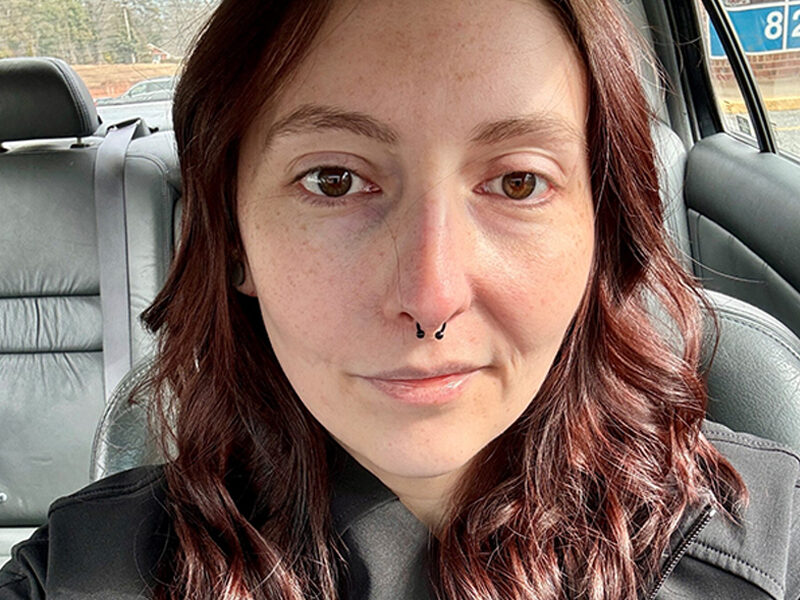By Candie Johnson
Experiences shape who we are. They shape our perceptions of the world, how we navigate life, the frame we see the world through, and they have the power to define us. It has been my lived experiences that brought me to where I am today: a child welfare social worker serving kinship families.
When I was a child, I never thought I’d be a social worker. I was raised in a family with priorities more centered around self-indulgence than education. I was taught to fear social workers because they would take me away from my family. I was told horror stories of what foster care was like. When I was eleven, that fiction became a reality. Fortunately, the experience was far from how it was presented to me.
After living a life of poverty filled with abuse and neglect, foster care was a paradise. There were still difficult times, but I no longer had to worry about being abused or parenting my three younger sisters. My only responsibility was to be a kid. As anyone in child welfare can attest to, that transition is not an easy one, especially with siblings. I fed, bathed, changed, supervised, and disciplined my siblings since I was a toddler and suddenly that responsibility was lifted. It took a long time, but I slowly adjusted. After around two weeks in my first placement, my two youngest siblings were placed in a different foster home. Sometime later, my other sibling was moved. We still saw one another at family visits, but I no longer had the pressure to parent them. While there was no safety reason for us to be separated, it was truly the best thing for me.
During my foster care journey I lived in three different foster homes and moved four times over three and a half years. Three months after my fourteenth birthday, I was adopted.
My adoptive mother obtained her Master of Social Work degree when I was a teenager. I’d never considered becoming a social worker, but seeing her journey and reflecting on my own experiences changed that. I decided I wanted to be the kind of social worker that my siblings and I needed. I wanted to work to impact the child welfare system from within, even in some small way.
I obtained my Bachelor of Social Work degree in 2017 and have practiced child welfare since. I’m now a MSW. I’m careful to keep my biases in check and to not let my experiences overshadow those of the families I serve. I’m honest with my supervisor when I feel my own bias may hinder my ability to give my best to a family and seek guidance to ensure my experiences aren’t clouding my professional judgement. Despite these efforts, my lived experience will forever shape my perceptions of this work and I’m thankful for that. I have an understanding of the child welfare system and what my families are going through that many do not and it is a blessing.
I haven’t made any profound impact to the system, but I have impacted the lives of countless families. My experience is not the same as every youth or family I work with, nor is it unique. I use my personal experiences along with my education and training to guide how I engage with families. I strive to be approachable, honest, ethical, and upfront. I’m a stringent advocate of relative and non-relative kinship placements whenever it’s safe, even knowing that wasn’t the best option for me when I was a child. As NC continues to work towards prioritizing kin, I’m proud to be a part of that change.
I’d like to leave you with some things I have come to recognize in hindsight:
- I’ve always struggled with severe anxiety and ADHD, but I was not diagnosed until adulthood. I believe my fear of punishment, my general disposition, my parentification, and the sanctuary school offered me all prevented both from being identified earlier. I realize my trauma and coping skills masked the symptoms. It wasn’t until I was in my BSW program that I even connected the feelings to names. When I work with children now, I try to view the big picture as well as the small nuances to attempt to discern if there is an unmet need being overlooked.
- It’s important for siblings to be together if there are no safety concerns in most situations. Both the state of NC and the Social Work profession recognize this. I maintain this as a professional, but I see the other side based on my own experiences. There were no safety concerns that would have prevented my siblings and me from remaining together, but I know that is what was best for me.
- Birth family connections are vital. I see now that my birth parents struggled with mental illness, substance use, intergenerational trauma, and developmental/intellectual disabilities that prevented them from being safe parents. While I don’t have a great relationship with them now, it has been helpful for me to understand the abuse and neglect I experienced. I recognize they did not have the capacity to be safe and appropriate parents.
- I still remember the day I was told my parents’ rights were terminated. I hadn’t been given any inclination the case was headed that way, nor did I really understand what it meant. While I didn’t wish to return to them, I still felt unmoored, blindsided, and powerless. I don’t want any youth to feel that way.
- There is bias towards kinship placements with misconceptions such as “the apple doesn’t fall far from the tree.” I am a living example of how incorrect that assumption can be. I advocate daily for kinship families to fight against such injustices, and I hope you will too.
Candie Johnson is a Kinship SW III with the Catawba County Department of Social Services


